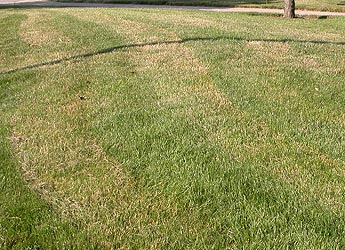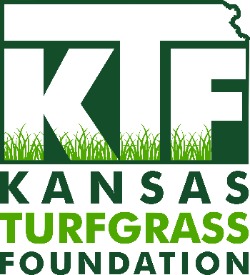Scalping Turf

Scalping is the term used to describe the brown, stemmy, appearance of the turfgrass canopy when too much of the leaf blade is removed during any single mowing. Ideally you should never remove more than 1/3 of the leaf blade. Scalping is never desirable but is most dangerous to cool-season turfgrasses like Kentucky bluegrass during the summer stress months or any drought period. Once the turf has been scalped the turf plant must focus its energy into regrowing leaf blades rather than on sustaining the root system. During the summer cool-season grasses naturally grow slowly and it will take considerable time, probably several weeks, to fully recover.
Occurrence
Scalping may occur for a variety of reasons but usually is due to equipment malfunction, dull mower blades, blades not turning properly, or waiting too long between successive mowings. Commercial mowers with wide decks and multiple mower blades need to be checked regularly as they can easily get out of adjustment.
Avoiding Scalping
Most cool-season lawn grasses perform best when maintained between 2 and 3 inches. The higher the better! Kentucky bluegrass and perennial ryegrass perform well at 2 inches and turf-type tall fescue performs better at 3 inches. In order to follow the 1/3 rule of mowing for Kentucky bluegrass you need to mow when the turf reaches 3 inches. Similarly, for warm-season turfgrasses like zoysiagrass a 2 inch mowing height is appropriate.
Theoretically for most cool-season turfgrass species you could set your lawn mower as high as it will go and never set it again. This is very healthy management practice. It provides the greatest number of leaf blades to capture sunlight. More sunlight captured means maximum photosynthesis and more energy for the plant. More energy means a stronger turf plant with more stored plant foods and a healthier root system. Additionally, the taller turf canopy shades the soil from intense summer sun, keeping the underlying soil and roots cooler. In reality most home-owners prefer a somewhat closer mowed canopy.
Suggested mowing heights for commonly used turfgrass species
| Turf Species | Mowing Height (in inches) |
|---|---|
| Fine-leaf Fescues | 2 to 3 |
| Tall Fescues | 2 to 3 |
| Perennial Ryegrass | 2 to 3 |
| Kentucky Bluegrass | 2 to 3 |
| Zoysiagrass | 1 to 1.5 |
| Bermudagrass | 1/2* to 2 |
| Buffalograss | 2 to 3 or unmowed |
*Mowing turf at less than 1 inch requires a reel type mower.
Helpful Hints
When is the best time to mow? Dry turf mows more cleanly than wet turf because the clippings do not stick together. Furthermore, the clippings that fall on the surface will easily filter back into the canopy and produce a more aesthetically pleasing appearance. Remember, however, not to mow turf that is suffering from extreme drought stress. The turf will be damaged by the heavy equipment and the remaining wheel tracks will take a long time to recover.
One of the factors that contributes to scalping is that most homeowners have no idea what mowing height their mower is actually set at (most commercially available rotary mowers used for homeowners range from about 5/8 inches to 3 ½ inches) and owner's manuals often do not include this information. A simple way to check the mowing height of a rotary mower is to place the mower on a hard flat surface like the garage floor, then using a tape measure (a stiff piece of paper/cardboard and pen can work too), determine the distance between the hard surface and the cutting edge of the mower blade. This distance is termed the “bench” setting and considered the mowing height. In reality, the actual field cutting height may be slightly different than the bench setting. Wet conditions, soft soil and a thick, spongy thatch layer all can affect actual cutting heights.
If for some reason your turf becomes excessively tall, perhaps due to a summer vacation, etc. resist the temptation to cut everything back to the original mowing height all at once. It is much better to spend the next three or four mowings slowly reducing the turf back to its intended maintenance height. Start with the mower as high as it can be set then mow every few days allowing for some re-growth. Then gradually reduce the mower settings until the maintenance height is achieved, remember the 1/3 rule.
Last but not least make sure you use a sharp mower blade. A sharp mower blade will ensure a healthy cut and less ragged appearance. In an ideal world mower blades should be sharpened or replaced 3 or 4 times throughout the season depending on intensity of use. A sharp mower blade is essential for properly maintaining new seedings.



